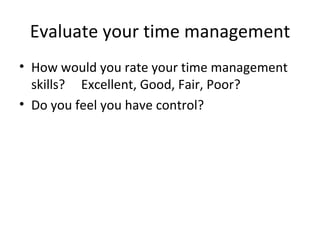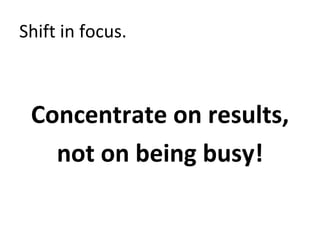Managing time human services
- 1. Managing Time HSE 220 – Zook, Sp 2011
- 2. Objectives • Develop a more clear understanding of strategies for effective time management • Develop a greater self-awareness of how you currently use your time
- 4. Evaluate your time management • How would you rate your time management skills? Excellent, Good, Fair, Poor? • Do you feel you have control?
- 5. What is your style • Are you a PLANNER? • Strategies used by planners are: • create an overall plan for the year: get/make a wall chart; mark exam times, holidays, due dates for assignments, mark new things as they come up • draw up a term plan: write in assignment dates. Do you have two at the same time? Change one, or plan to do them at the same time. • make weekly timetables: enter class times, work hours, family time, commitments, assignments, revision • have daily routines: set study times • Avoid feeling guilty: allow for flexibility.
- 6. What is your style? • OR are you a DEADLINER? • Some people like to work to deadlines and work best under pressure (dead-liners). • These people find it hard to stick to a plan and often put things off till last minute. • Dead-liners are strongly advised….This doesn’t work. Continuing this approach risks having work and life be a mess.
- 7. Effectiveness of time management techniques • People who use these techniques routinely are the highest achievers in all walks of life, from business to sports to public service. • If you use these skills well, you will be able to function effectively, even under intense pressure
- 9. Shift in focus. Concentrate on results, not on being busy!
- 10. The 80:20 rule • Many people spend their days in a frenzy of activities that produce few results because they are not concentrating on the right things. • 80% of unfocused effort generates only 20% of results. The remaining 80% of results are achieved with only 20% of the effort.
- 11. Roadblock to successful time management PROCRASTINATION
- 12. Why do we procrastinate? • Difficulty Concentrating • Fear and Anxiety • Negative Self-beliefs • Unrealistic Expectations & Perfectionism • Don’t know where to start. • To avoid an unpleasant task. • We’re afraid to fail. • Waiting for more information. • You may think if you put it off someone else will do it. • You’re over-committed. …just one more video game or one more look at Facebook…
- 13. Everybody does it but… Putting off tasks for a later time is normal, but if it becomes a stressor, we end up wasting a lot of valuable time and energy! Patterns of procrastination can turn in patterns of problems.
- 14. How to beat procrastination 1. Recognize when you are Procrastinating. Become aware of your favorite procrastination tactics and learn to catch yourself as soon as you start to wander off. 2. Break Inertia. Do small things to get yourself started! (e.g start the online assignment.).
- 15. How to beat procrastination • Divide project into small manageable pieces. Take one step at a time. Make use of small chunks of time. Writing a few lines now may inspire you to do more later. Start early and pace yourself. 4. Set reachable sub-goals that are specific. Saying “read 20 pages of Chapter 5 by 8pm” sounds better than saying “do some studying later.” This helps to gain a sense of accomplishment.
- 16. How to beat procrastination 5. Admit. No matter how much you try to tell yourself. You do not work best under pressure. List the things you have been avoiding. Prioritize them. Try to do at least one of them each day until you catch up.
- 17. How to beat procrastination 6. Don’t sabotage yourself. Set up your environment with as few distractions as possible. Arrange your work space the way you like it and work at times when you have peak energy. 7. Reward non-procrastinating behavior. You’ve finally made a dent in that paper you have been putting off. Give yourself a little reward. 8. Enjoy Your FREEDOM. When you complete an unpleasant task, when you get caught up. Take time and feel how nice it is to have it over and done with.
- 18. Use your time effectively 1. Start with the most important work at the start of your work period. • Do the things you don’t want to do first. • Begin group projects and big projects early and set up a realistic time line.
- 19. Using your email 1. Check your email daily. 2. Scan. 3. Respond to questions promptly.
- 21. Get organized • Don’t make excuses such as: – It takes too much time. – You don’t know how. – You want to do it “perfectly.” • Often worst performers are those who seem to be working hardest and longest. They are very busy, disorganized and not effective.
- 22. Using your calendar • Add a meeting/event as soon as you know about it. • Set personal deadlines. • Set group deadlines. • Write dates for follow-up. • Begin projects early and make a step-by-step schedule. Pace.
- 24. Getting ready for human services work • Human services work often demands that professionals: – Complete paperwork by deadlines – Keep to a schedule of meetings, appts, routines – Meet productivity standards – Juggle multiple tasks – Manage crisis on top of day-to-day tasks – Coordinate quickly to connect with people
- 25. Lists of time tips from human service professionals • Schedule • Set time limits • Make priority lists • Organize!!! • Pace email and other • Plan flex time to interruptions manage crisis • Control clutter • Use waiting time • Stop the time busters • Eat, sleep, exercise so • Keep routines can function optimally • Do paperwork at peak • Plan for catch-up blocks times. • De-stress
- 26. Special tips from Case managers • Schedule – in office and field days • Segment your workday. Write out a daily task list and determine a time range to accomplish each task. • Plan ahead. Last minute work means disaster.
- 27. More special tips for Case managers • Maintain an open-door policy. Allow clients to come and talk to you about issues they may be experiencing as it relates to their case. • Keep track of tasks to do with each case, so can complete multiple tasks when a client initiate contact with you.
- 28. Wrap up Ditto!
- 29. References • Academic Support Services. (2011). Retrieved March 2, 2011, from State University of New York College of Environmental Science and Forestry: http://www.esf.edu/students/success/9-28%20Time%20Management.pd • Time Management Presentations. (2007). Retrieved March 2, 2011, from Time Management Central: http://www.time-management-central.net/time-management-ppt.html




























